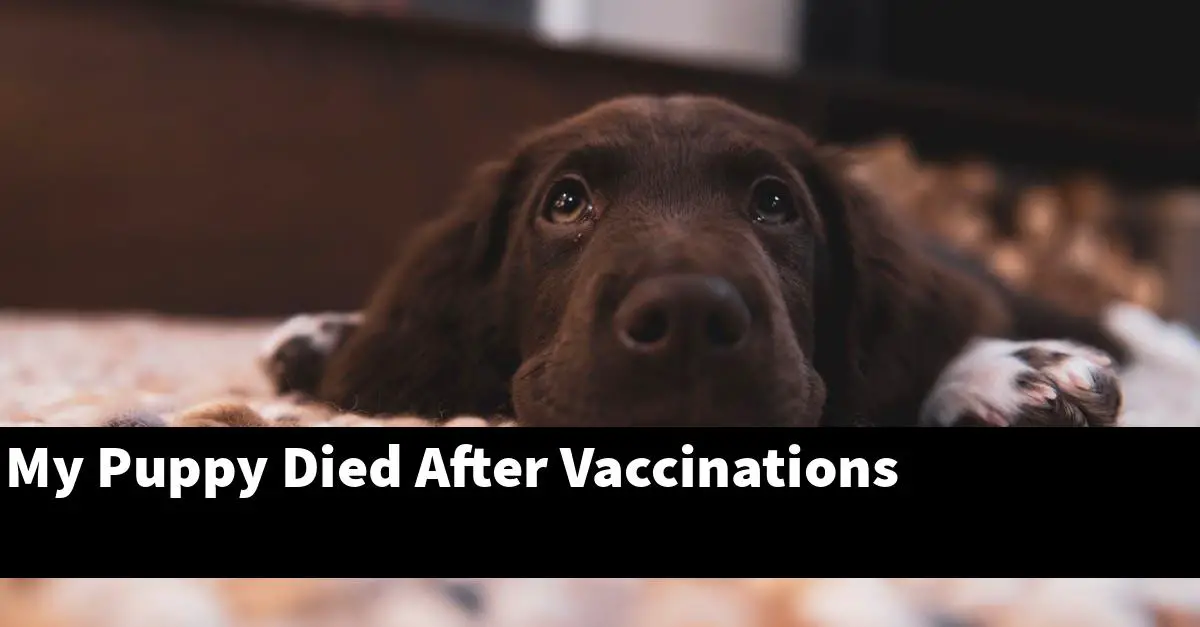Vaccinations are a necessary part of keeping your puppy healthy. However, sometimes puppies can have reactions to vaccinations that can be deadly. If your puppy dies after vaccinations, it is important to talk to your veterinarian to find out what may have caused the reaction.
The article is going to be covering the death of the author’s puppy after vaccinations.
Table of Contents
What are the possible side effects of vaccinations?
Vaccines are made from viruses, bacteria, or toxins that have been weakened or killed. They work by causing your body to produce immunity, or resistance, to a particular disease.
Most vaccines are very safe. Serious side effects are rare. In fact, your chance of having a serious reaction to a vaccine is much lower than your chance of being seriously injured by the disease the vaccine prevents.
Side effects from vaccines are usually mild and go away on their own. The most common side effects are soreness and redness where the shot was given. You may also have a low-grade fever. More serious side effects, such as allergic reactions, are rare.
If you have a reaction to a vaccine, it will usually occur within a few minutes to a few hours after the shot. If you have a severe reaction, such as difficulty breathing, call 911 or get to a hospital right away.
Why do puppies need vaccinations?
Puppies need vaccinations to help protect them against contagious and deadly diseases. Vaccinations work by exposing puppies to a small amount of a modified or weakened form of a virus or bacteria. As puppies develop immunity, or resistance, to the virus or bacteria, they are less likely to contract the disease.
Puppies are vaccinated beginning at around six to eight weeks of age. The initial series of vaccinations is typically given in three doses, spaced three to four weeks apart. A booster vaccination is usually given one year later. After that, most dogs only need an annual booster.
Puppies need to be vaccinated to protect them against a variety of diseases, including rabies, distemper, hepatitis, and parvovirus. Rabies is a fatal disease that affects the nervous system. Distemper is a highly contagious disease that can cause respiratory problems, gastrointestinal distress, and seizures. Hepatitis is a viral disease that affects the liver. Parvovirus is a highly contagious virus that can cause severe gastrointestinal illness.
Puppies need to be vaccinated to protect them against a variety of diseases, including rabies, distemper, hepatitis, and parvovirus. Rabies is a fatal disease that affects the nervous system. Distemper is a highly contagious disease that can cause respiratory problems, gastrointestinal distress, and seizures. Hepatitis is a viral disease that affects the liver. Parvovirus is a highly contagious virus that can cause severe gastrointestinal illness.
When is the best time to vaccinate puppies?
Puppies should be vaccinated at 8, 12, and 16 weeks of age. This will ensure that they are protected from common diseases, such as parvovirus, distemper, and hepatitis.
How do you know if your puppy is having a reaction to a vaccine?
There are a few things to look for when trying to determine if your puppy is having a reaction to a vaccine. One is to check for signs of pain or discomfort at the injection site. If your puppy is whimpering or crying more than usual, or if there is redness, swelling, or drainage from the injection site, these could be signs that your puppy is having a reaction to the vaccine. Another thing to look for is changes in behavior. If your puppy is listless, has a decreased appetite, or is lethargic, these could also be signs of a reaction to the vaccine. If you notice any of these signs, it is important to contact your veterinarian right away. They will be able to determine if your puppy is having a reaction to the vaccine and can provide the appropriate treatment.
Do vaccines affect puppies?
Yes, vaccines can affect puppies. Vaccines work by protecting against diseases by stimulating the immune system to produce antibodies. When a puppy is vaccinated, their immune system is exposed to a small amount of the virus or bacteria, which helps them build immunity to the disease. However, because puppies have immature immune systems, they may not be able to handle the vaccine as well as an adult dog. This can cause side effects such as fever, lethargy, and loss of appetite. If you are concerned that your puppy is having a reaction to a vaccine, please contact your veterinarian.
What happens if your puppy is over vaccinated?
If your puppy is over vaccinated, they may experience a variety of side effects. The most common side effect is an allergic reaction, which can cause a wide range of symptoms including itching, hives, swelling, and difficulty breathing. In severe cases, anaphylactic shock can occur, which can be fatal. Other side effects of over vaccination include fever, lethargy, diarrhea, and vomiting. If your puppy experiences any of these side effects, it is important to seek veterinary care immediately.
How long does it take puppies to recover from vaccines?
Puppies are typically vaccinated between 6-8 weeks of age and again at 10-12 weeks of age. The vaccines generally take 2-3 weeks to become fully effective.
Can puppies be unwell after vaccinations?
Yes, puppies can be unwell after vaccinations. This is because their immune systems are not fully developed and they are not able to fight off infections as well as adult dogs. Puppies are also more likely to experience side effects from vaccinations than adult dogs.
Summary
:
Puppies can have reactions to vaccinations that can be deadly. If your puppy dies after vaccinations, it is important to talk to your veterinarian to find out what may have caused the reaction.


